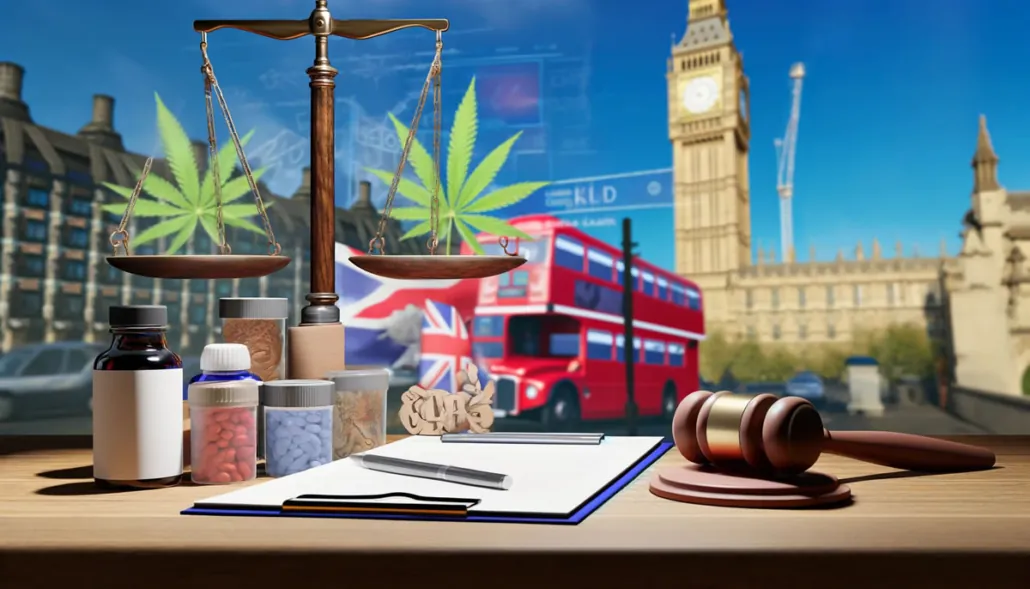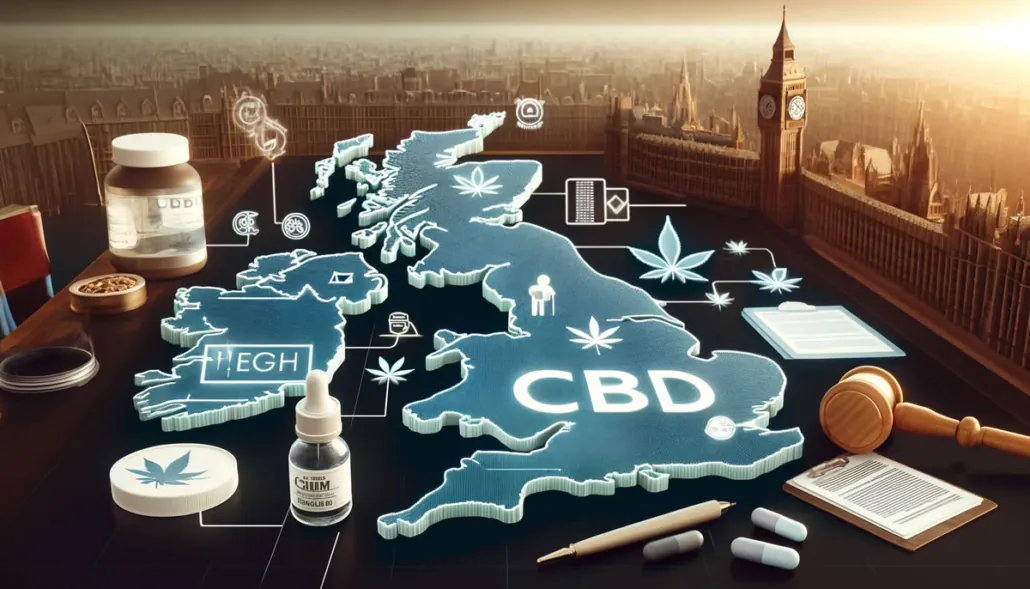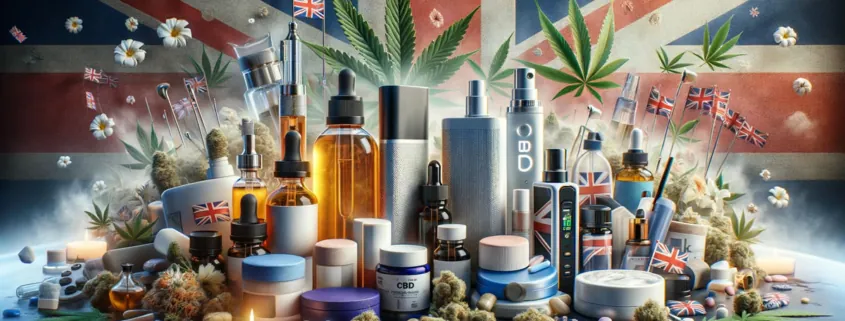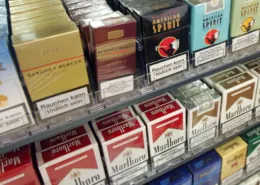A Comprehensive Guide to CBD Laws and Regulations in the UK (2024)
As we enter 2024, it is crucial for consumers, businesses, and stakeholders to understand the complex legal landscape surrounding cannabidiol (CBD) in the United Kingdom. This article aims to provide a detailed and authoritative overview of the current laws and regulations governing CBD products, including oils, cosmetics, vapes, and flowers. By the end of this guide, readers will have a clear understanding of the legal requirements, THC limits, and the Novel Food authorization process, empowering them to make informed decisions and contribute to the growth of a safe and compliant CBD market.
The Legality of CBD Products in the UK
The legal status of CBD products in the UK varies depending on the type of product:
- CBD Oils, Supplements, Food, and Beverages: As of February 13, 2020, new CBD food, drink, and supplement products must obtain Novel Food authorization from the Food Standards Agency (FSA) before entering the market. This process involves submitting a dossier of toxicological data for review and approval, which can take at least one year and cost upwards of £50,000. This regulatory measure ensures that CBD products in these categories are safe for consumption and properly labeled.
- CBD Cosmetics: CBD cosmetics are permitted in the UK, subject to compliance with cosmetic regulations and THC limits. Manufacturers must ensure that their products adhere to the necessary guidelines to guarantee consumer safety and legal compliance. This includes accurate labeling, including information on CBD and THC content, and the absence of any prohibited substances.
- CBD Vapes: CBD vapes are allowed in the UK, provided they comply with the THC limit and non-nicotine vape product regulations outlined in the General Product Safety Regulations. Manufacturers and retailers must stay informed about any updates to these regulations to maintain compliance. It is essential to ensure that CBD vape products are free from contaminants and are accurately labeled to protect consumer health and safety.
- CBD Flowers: The legal status of CBD flowers in the UK is currently in transition. Recent legal precedents, such as the June 2023 Court of Appeal decision, have paved the way for the potential legalization of CBD flower varieties. This ruling provides protection to businesses that operated before December 31, 2020, and confirms that CBD flowers are not narcotics, offering a potential defense against criminal charges. As the legal landscape continues to evolve, it is crucial to stay informed about any updates to UK laws that may permit the sale of CBD flowers in the near future.

Importing CBD and Obtaining Licenses
Importing raw CBD into the UK is relatively straightforward, provided that the THC content is below 0.2% or not detected by border authorities. Verification by a UKAS accredited ISO lab or equivalent with a limit of quantification (LOQ) of 0.2% is required to ensure compliance with UK regulations. This strict THC limit helps prevent the importation of illegal or potentially harmful substances.
Applying for a hemp cultivation license or any other license related to CBD or hemp in the UK requires significant capital, time, and resources. Prospective licensees must demonstrate their ability to meet the strict requirements set forth by the Home Office, including security measures, record-keeping, and adherence to cultivation guidelines. The application process can be complex and time-consuming, emphasizing the need for careful planning and expert guidance.
Selling CBD Products in Other EU Markets
When selling CBD products in other EU markets, it is essential to seek expert advice to navigate the specific laws and regulations of each Member State, as they may be more stringent than those in the UK. Each country has its own set of rules governing CBD products, including THC limits, labeling requirements, and marketing restrictions. Failure to comply with these regulations can result in legal consequences and damage to brand reputation. Businesses must conduct thorough research and consult with local legal experts to ensure compliance and success in international markets.
THC Limits and the Misuse of Drugs Act
There is a common misconception that the legal THC limit in the UK is 0.2%. However, this figure actually refers to the threshold for subsidies for cannabis cultivation and does not apply to CBD products. Under the Misuse of Drugs Regulations 2001, the ‘exempt product’ status allows for the presence of no more than 1 mg of THC per pack, provided certain conditions are met. This is the legal THC limit for CBD products in the UK.
The Misuse of Drugs Act 1971, along with its subsequent amendments in 2001 and 2010, lays down the strict conditions under which THC is allowed. These laws provide clarity on the legal status of THC in the UK and emphasize the importance of adhering to the 1 mg per pack limit for CBD products. Failure to comply with these regulations can result in legal consequences, including fines and imprisonment.
CBD as a Novel Food
CBD edibles, such as oils, capsules, oral sprays, gummies, mints, sweets, tea, coffee, beer, soft drinks, snacks, and energy bars, fall under the purview of Novel Food regulations in the UK. However, foods derived from cold-pressed hemp seed oil or flour are exempt from these requirements.
The Novel Food authorization process is a crucial step in ensuring the safety and quality of CBD products. Companies must submit a comprehensive dossier detailing the product’s composition, manufacturing process, and toxicological data to the FSA for review and approval. This process can be lengthy and costly, but it is essential for protecting consumer health and maintaining public trust in the CBD industry.
The Legality of CBD Flowers and Buds in the UK
The legal status of CBD flowers and buds in the UK has been a subject of debate and uncertainty. However, the June 2023 Court of Appeal decision has set significant precedents for the CBD flower business in the UK. This ruling provides protection to businesses that operated before December 31, 2020, and confirms that CBD flowers are not narcotics, offering a potential defense against criminal charges.
Currently, industrial hemp farmers in the UK must destroy or leave the flowers and buds of the plant to rot in the field, as only the stalks and seeds can be processed for industrial purposes. However, with the recent court ruling, the legal status of CBD flowers with THC below 0.2% and from EU origin is in transition. Updated UK laws may soon permit the sale of CBD flowers, opening up new opportunities for the CBD industry.
Labeling and Safety
- Strict Labeling Rules: CBD products must be accurately labeled, including information on CBD and THC content, ingredients, potential allergens, and nutritional information. This is to ensure consumer safety and transparency.
- Third-Party Testing: It is recommended to check for third-party lab reports to verify the content and safety of CBD products. This helps ensure that the products do not contain illegal levels of THC or other harmful substances.
Age Restrictions and Importation
- Age Restrictions: Consumers must be over the age of 18 to purchase CBD products.
- Importation Laws: Importing CBD products into the UK must follow specific guidelines to ensure legality.

A Timeline of Cannabis Law Development in the UK
The legal landscape of cannabis and CBD in the UK has evolved significantly over the past century. Here is a timeline of the key developments:
- 1928: The Dangerous Drugs Act introduces the first laws on cannabis possession in Britain.
- 1967: The Drugs (Prevention of Misuse) Act recommends reducing penalties for cannabis possession.
- 1971: The Misuse of Drugs Act restricts the cultivation of all cannabis plant species.
- 2001: The Misuse of Drugs Regulations permit cannabis cultivation under a special Home Office license and allows cannabis smoking for research purposes.
- 2015: The Misuse of Drugs (Designation) (Amendment) Order paves the way for the first ‘medical marijuana’ in the UK, with Sativex becoming the first cannabis-based medicine allowed on the UK market under prescription.
- 2025: Potential drafting of new rules for CBD.
As the legal framework continues to evolve, it is crucial for stakeholders to stay informed about the latest developments and adapt to the changing regulatory landscape.
CBD Terminology Explained
To better understand the CBD industry and its legal aspects, it is essential to familiarize oneself with key terminology:
- CBD: Cannabidiol, a non-psychoactive cannabinoid with medicinal properties.
- Cannabinoid: A group of compounds almost unique to the cannabis plant, including THC, CBD, CBN, CBG, and CBC.
- THC: Tetrahydrocannabinol, a psychoactive cannabinoid responsible for the mood-changing effects of cannabis.
- Sativex: The trade name for the UK’s only approved cannabis-based medicine, an oral spray containing 2.7 mg THC and 2.5 mg CBD.
Understanding these terms is crucial for navigating the complex world of CBD regulations and making informed decisions as a consumer or business owner.
The Role of Regulatory Bodies
The Medicines and Healthcare products Regulatory Agency (MHRA) and Trading Standards play vital roles in overseeing the CBD market in the UK. The MHRA focuses on patient safety and encourages individuals using CBD products for medical purposes to consult with their doctors. This ensures that CBD is used appropriately and under medical supervision when necessary.
Trading Standards, the authority overseeing the CBD retail market, ensures compliance with labeling and safety regulations. Although the Chartered Institute of Trading Standards has not yet released comprehensive guidance on CBD, they are likely to investigate non-compliant labeling, such as health and medicinal claims, and have the power to seize non-compliant or unsafe products from retail outlets. As the CBD market continues to grow, it is expected that Trading Standards will play an increasingly active role in maintaining a safe and compliant marketplace.
Conclusion
As the UK enters 2024, the legal landscape surrounding CBD remains complex and ever-evolving. By understanding the current laws and regulations governing CBD products, including THC limits, Novel Food authorization, and the legality of CBD flowers, consumers and businesses can make informed decisions and contribute to the growth of a safe and compliant CBD market.
It is crucial for stakeholders to stay informed about the latest developments in CBD regulations and seek expert advice when necessary. By working together and adhering to the legal framework, the UK CBD industry can continue to thrive and provide consumers with high-quality, safe, and legally compliant products.
- Best Delta-8 THC Carts of 2025: Top 5 Vapes Reviewed - July 16, 2025
- UK Vape Ban: Your Guide to Legal Alternatives in 2025 - July 4, 2025
- The Global and U.S. Vaping Industry in 2025: Growth, Challenges, and Opportunities - May 27, 2025









